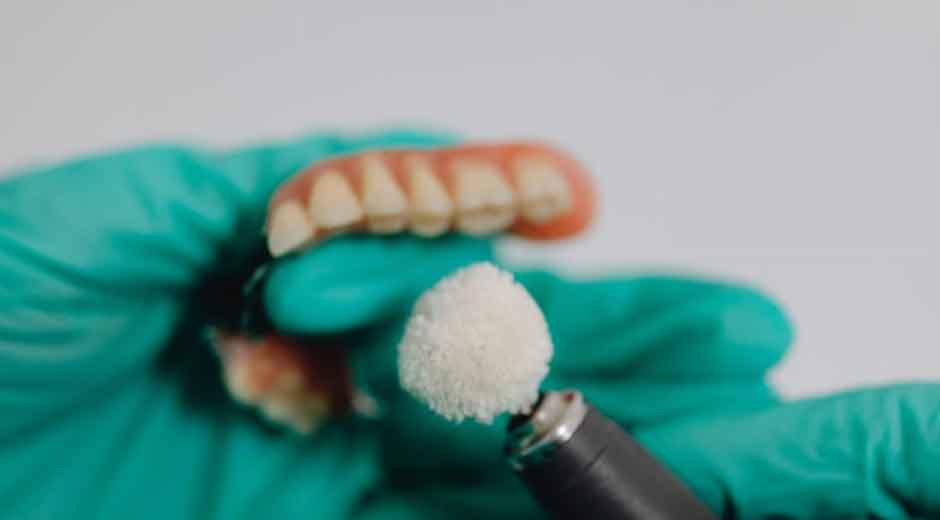Thinking about replacing your missing teeth, but not sure what kind of denture material is best for you?
You are not alone. By the end of 2025, it’s expected that 42.46 million Americans will be wearing dentures, so there’s never been a better time to get denture dentistry services!
Here’s the honest truth…
Dentures are not all made the same. The kind of material they are made of impacts the comfort, durability, lifespan, and aesthetics of your smile, and not all materials are equal.
Here’s what you’ll learn:
- The Main Types of Denture Materials
- How Materials Differ
- Which Material Is Best For Your Situation
- Innovations in Denture Technology
The Main Types of Denture Materials
Denture dentistry services have come a long way, and before you choose the material you want for your dentures, it’s important to understand your options. Most people don’t realize there is more than one kind of material used for dentures, with different advantages depending on your needs, budget, and lifestyle.
And here’s why that matters…
The dentures market is expected to grow in value from $2.43 billion in 2025 to $3.79 billion by 2032, and manufacturers are constantly developing and improving their materials. The good news is that means more and better choices for you.
Acrylic Resin: The Most Popular Material
Acrylic is the most common denture material used for custom denturesand has been the go-to choice for denture dentistry services for decades. This lightweight, pliable plastic material is easy for your dentist to adjust, relatively inexpensive, and simple to repair if damaged.
Here are the things to know about acrylic dentures:
- Affordable, budget-friendly choice for most people
- Pink base closely resembles natural gum tissue
- Easy to adjust for your dentist
- Lightweight material compared to other options
The bad news is that acrylic dentures typically only last for 5-8 years before they start to break down. The material is more prone to wear over time and can stain more easily if not properly maintained. The material is also porous and can absorb moisture, so you have to clean them well every day to avoid bacterial growth.
Porcelain: The Premium Material
Looking for the most natural-looking dentures possible?
Try porcelain!
Porcelain has been the gold standard for denture teeth for years and has a super natural look that mimics the real thing. The material has a slight translucent quality and will reflect light almost identically to natural tooth enamel.
Porcelain dentures offer several advantages:
- More durable than acrylic
- Highly stain resistant
- Natural, tooth-like appearance
- Able to withstand wear and tear better than other materials
But there’s a catch…
Porcelain dentures are more expensive than acrylics. The material is also more brittle and likely to chip or break if dropped. The material can also be harder than acrylic and put more pressure on your gums and jawbone, which can be a problem if you’re already experiencing bone loss.
Flexible Dentures: The Comfortable Denture
Flexible dentures are a big game changer for people who experience discomfort or irritation with traditional dentures.
Made from thermoplastic materials like nylon, these dentures flex and bend as your mouth moves. The flexibility results in a more comfortable, more natural fit and also better adapts to changes in your mouth over time.
Flexible dentures are super popular because…
Just look at the numbers! Over 37% of the dentures that launched in the past year featured antimicrobial and biocompatible materials, and the availability of flexible dentures (made from thermoplastic resins) has already grown by 31% in the past year.
The reason for the boom in popularity is easy to understand. Flexible dentures:
- Are metal clasp-free
- Seamlessly match the color of natural gums
- Hypoallergenic (ideal for people with sensitivities)
- Offer a stable, secure fit
The only downside? They might not be as strong or durable as traditional acrylic or metal-based dentures. If a flexible denture breaks, the repair process can be more complicated and costly.
Metal-Based Dentures: The Long-Lasting Denture
Want something that lasts?
Metal-based dentures may be the answer.
Titanium or cobalt-chromium framework makes these dentures very durable and long-lasting. Metal dentures can last 10-20 years or more with proper care.
Metal dentures offer several benefits:
- Super durable and long-lasting
- Thinner, less bulky fit
- Better support for daily chewing and other activities
- Comfortable to wear
The tradeoff is that the metal is more visible when you smile or talk. Some people just don’t like the way they look compared to acrylic dentures, which are more natural. Metal dentures are also more expensive than acrylic.
If you have allergies to certain metals, be sure to discuss the possibility of other materials, such as titanium, with your dentist.
Choosing the Right Material For Your Needs
Which material should you choose for your dentures?
It depends on a few factors, including:
Your budget is the first concern for many people, and for a good reason. Acrylic dentures are the most budget-friendly option, while porcelain and metal-based versions are more expensive.
Your lifestyle and activity level also matter. If you’re very active or worried about breaking or damaging your dentures, flexible or metal-based dentures are more durable than porcelain.
Your current oral health is important as well. If you have bone loss or receding gums, acrylic or flexible dentures will put less pressure on your gums and jawbone compared to harder materials like porcelain.
Aesthetics are also a concern for many people. Porcelain is the closest match to natural teeth, but modern acrylic materials also have come a long way and can be very lifelike.
The Latest Innovations In Denture Materials
Denture technology is constantly advancing, and new developments are making dentures better than ever before. Digital dentures with CAD/CAM technology and 3D printing are becoming more popular, offering superior fit and faster production times.
Antimicrobial denture materials are also on the rise, which use advanced technology to prevent bacterial growth and reduce oral health issues like bad breath and other complications.
The future is bright if you are in the market for dentures.
Final Thoughts
Understanding the different types of denture materials available is the first step in making an informed choice about your oral health. Whether you go with acrylic for budget, porcelain for natural aesthetics, flexible for comfort, or metal-based for durability, there is a material that is the right fit for your needs.
The most important thing is to work with a qualified dentist who can evaluate your needs and recommend the best material for your situation. Denture dentistry services are better than ever before, with more choices and customization options than ever before.
Don’t settle for dentures that don’t meet your expectations. Take the time to learn about your options and find the material that works best for your lifestyle and budget.
Your smile is worth it.










